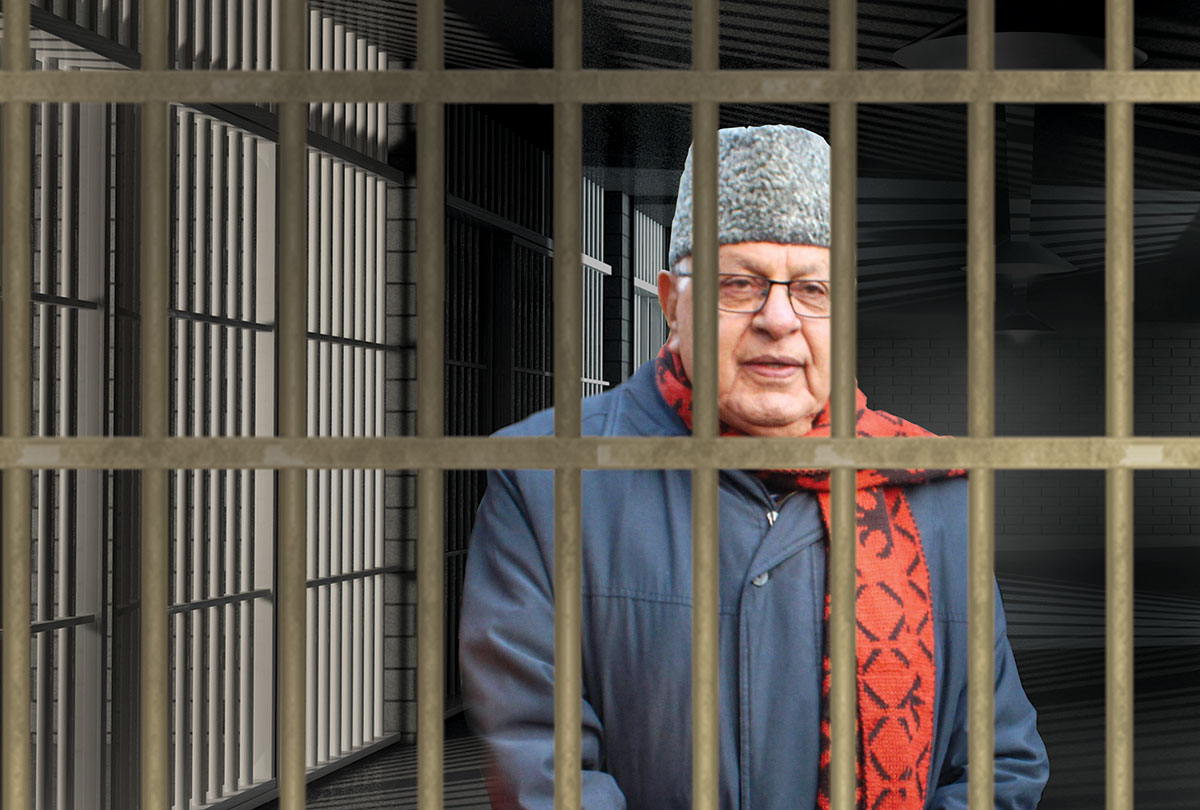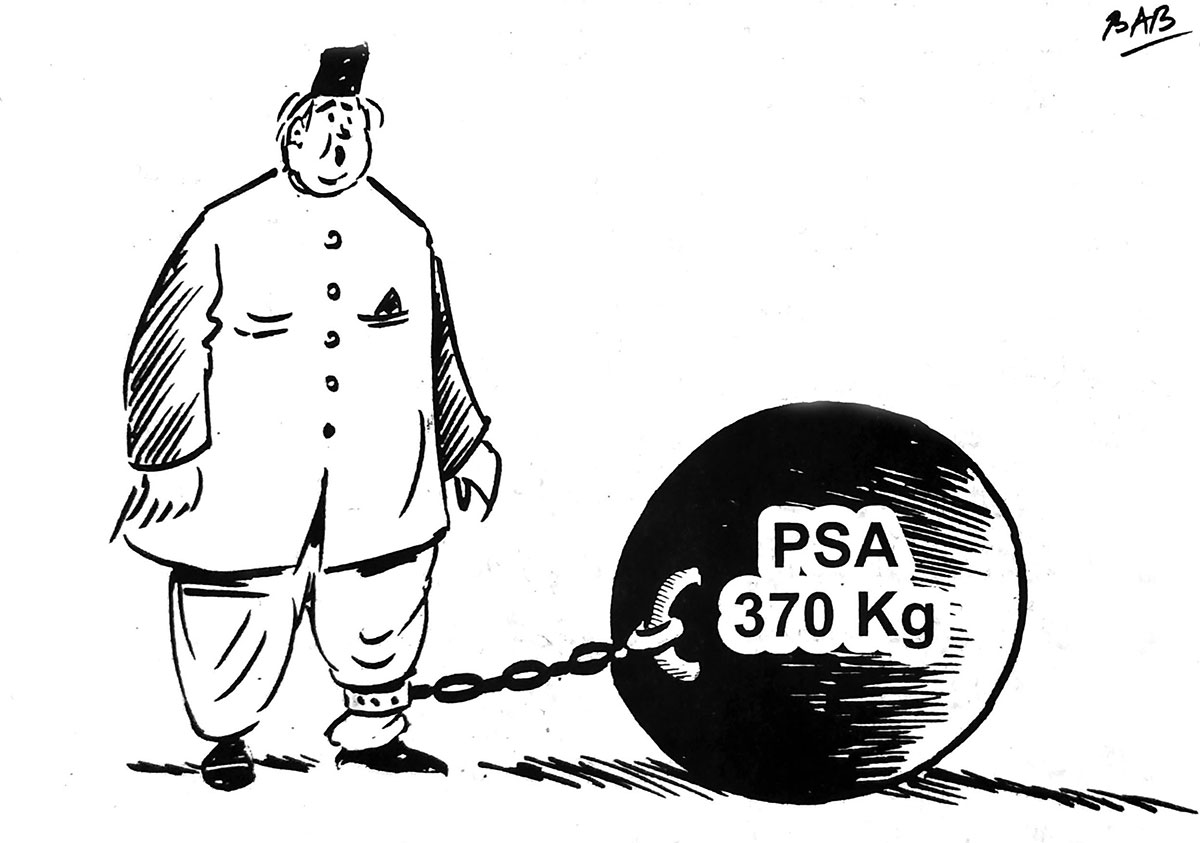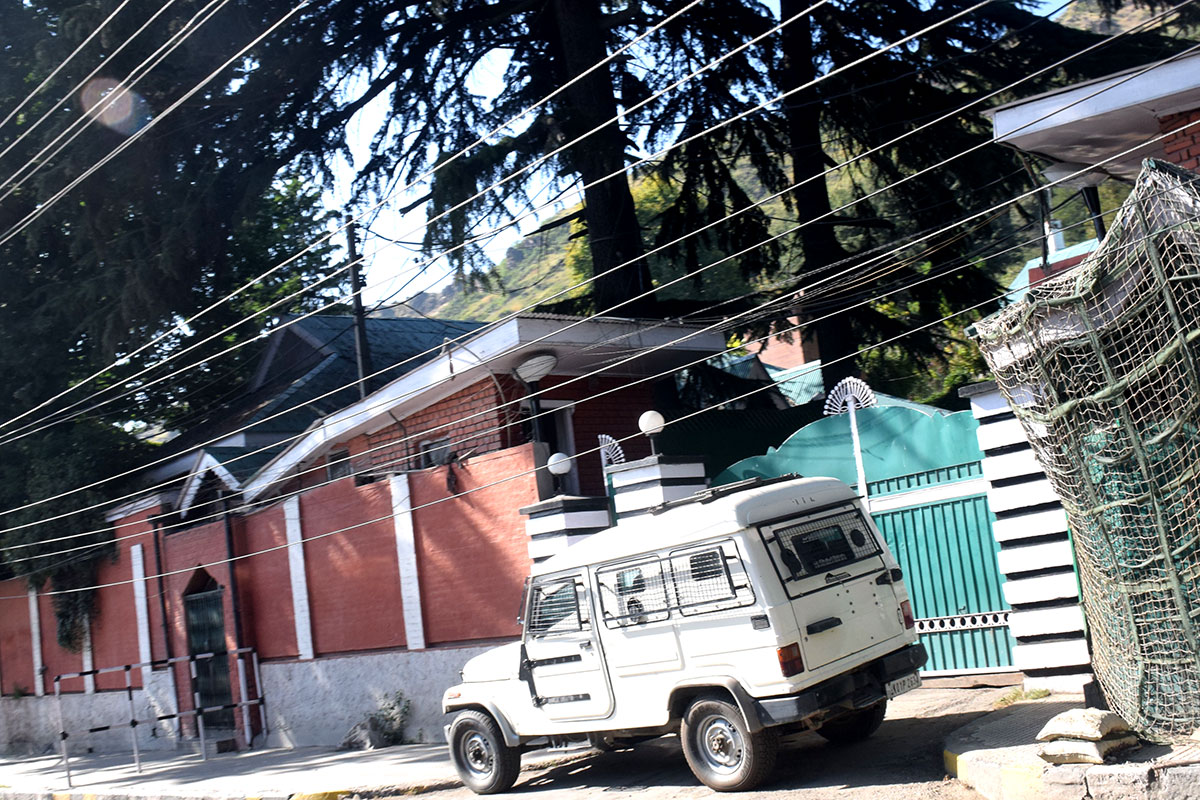Almost 42 days after he was restricted to his Gupkar home, the government finally arrested DrFarooq Abdullah formally under Public Safety Act. The arrest of five-time Chief Minister and five-time MP is not an ordinary development in Kashmir history, Masood Hussain reports

“If you have in mind someone who ends up in jail, you can count me out. I am the last person to like being jailed. I like to play golf. What I am going to do in jail?”
Dr Farooq Abdullah in LalChowk on June 28, 1989
On September 16, morning Safiya Abdullah, one of the three daughters of Dr Farooq Abdullah, left her home to drop her kids at the army school when she saw the staff of her father on the road. Once back, she enquired and was shocked to know that Dr Abdullah has been detained under the Public Safety Act (PSA). The orders had been served to him at around 11:30 pm, on September 15.
After a lot of insistence, Safiya told Rising Kashmir, she was permitted to talk to her father on the intercom. Hearing her father’s voice, she said she broke down. Later, she met her brother, Omar, being held in HariNiwas, who had already come to know of the development. It started Safiya’s struggle to meet her father, who is unwell for a long time. They are neighbours to each other, separated by just a porous wall.
Safiya went to see Deputy Commissioner, Srinagar, who had gone to the secretariat. She also went there. “The last time, I had visited the civil secretariat was with my grandfather (Sheikh Abdullah),” she told the newspaper. “Today, I was made to walk from the main gate and I had no idea who to approach.”
Finally, she met her father. She saw the grounds of detention and terms them ridiculous. “Despite receiving abuses from common people, Omar and Farooq sahib always stood by the side of the Indian state,” Safiya told the newspaper. “All their lives they believed in the ‘idea of India’. They always pitched for Kashmir resolution within the ambit of the Indian constitution. Today, they feel betrayed.”
The order, Greater Kashmir reported, accuses Dr Abdullah of “glorifying” militants; issuing statements aimed at “mobilising people against the state”; and threatening “the integrity of the country”. It says the octagenarian has “tremendous potential for creating an environment of public disorder within the district (Srinagar) and other parts of the valley”.
Dr Faooq’s formal arrest under PSA came within days after his friend Marumalarchi Dravida Munnetra Kazhagam (MDMK) leader Vaiko filed a habeas corpus petition before the Supreme Court. Vaiko, a Rajya Sabha member, had invited him for the September 15, birth anniversary of CN Annadurai, a former Tamil Nadu Chief Minister, to Chennai. Vaiko has made a formal request o Jammu and Kashmir government for permission. It was not granted so Vaiko went to the court.

“The actions of the Respondents (government) are completely illegal and arbitrary and violative of the right to protection of life and personal liberty, right to protection from arrest and detention and also against the right to free speech and expression which is the cornerstone of a democratic nation,” Vaiko’s petition said. “The right to free speech and expression is considered to have paramount importance in a democracy as it allows its citizens to effectively take part in the governance of the country.”
In anticipation of a possible order by the court, the governor’s administration in Srinagar formally arrested Abdullah. This vindicated the Kashmir’s “incarcerated” political class that any effort to seek the intervention of the court would lead to their formal arrest. That is why none of the 150-odd politicians of various parties and classes have approached the court of law, political insiders say. However, Vijaita Singh reported in The Hindu that five politicians including Mirwaiz Umer Farooq, two NC men and one each from PDP and Peoples’ Conference have “signed the bonds” and “gave an undertaking that they would not indulge in any political activity after their release”. The politicians are detained under Section 107 of the Code of Criminal Procedure (CrPC), it added.
Dr Farooq and many others have been restricted to special jails across Kashmir or have been limited to their homes since August 5. He, however, had managed coming out of his home on August 6, morning and talked to at least two TV channels. “I want to cry,” he told a news channel. “Yes, I want to cry at the grave of my father.” In a quick follow-up, the authorities posted additional security staff around his home to ensure the breach is not repeated. His son, Omar, however, was moved out of his residence and is being held at Hari Niwas.
In the week preceding the abrogation of Article 370 and downgrading of the state of Jammu and Kashmir to the Union Territory (UT), Dr Abdullah was grilled by the Enforcement Directorate (ED) in Chandigarh on July 31 in the infamous Rs 100 crore Jammu and Kashmir Cricket Association (JKCA) scam for four hours.
The Central Bureau of Investigation (CBI) that investigated the case filed the charge-sheet against Farooq and three others in July 2018. It alleged the foursome for allegedly misappropriating over Rs 43 crore BCCI grants received by JKCA between 2002 and 2011.
A day later, DrFarooq accompanied Omar Abdullah and NC MP Justice (retired) HusnainMasoodi to the Prime Minister Narendra Modi. Omar was happy about the meeting and insisted it was “reassuring” in wake of the deployments being made during rumours of Article 35(A) abrogation.
On August 2, Mehbooba Mufti attempted meeting DrFarooq but failed. She later met Sajjad Lone and a delegation visited governor Satya Pal Malik. Indications suggested that political parties were getting together as NC made public that it will be attending an all-party meeting on the issues. In anticipation of the meeting, they all were put under house arrest.
Dr Abdullah’s formal arrest is Kashmir history’s extraordinary development. A five-time Chief Minister (1982 – after his father’s demise; 1983, 1986, 1987, and 1996); a five-time MP and a central cabinet minister once, Dr Farooq Abdullah is the son of Sheikh Abdullah. Post militancy, he was part of India’s UN delegation in 1994 and later to the crucial United Nations Human Rights Council (UNHRC) meeting in Geneva in 1995 where India barely escaped a punitive resolution.
“The fact that Farooq was a Kashmir Muslim, that he had administered Kashmir as its democratically elected Chief Minister, that he had witnessed firsthand the history of post-1947 Kashmir by virtue of being Sheikh Abdullah’s son and that he knew in detail each attempt by Pakistan to disrupt the development of Kashmir, swung things in India’s favour,” AdityaSinha wrote in Farooq Abdullah: Kashmir’s Prodigal Son. “The Indian delegation was successful not only in preventing diplomatic and political embarrassment to India but also in driving home the point to the people of the Valley – who stood at Srinagar street corners during the last days of the debate, years glued to their radios – that Pakistan did not care for them or their cultural identity, that Pakistan’s motives were not only selfish but also a threat to Kashmiris in the long run.”
Then, DrFarooq was literally a non-resident Kashmiri. He had left within days after quitting his job in January 1990 as the Chief Minister in wake of the appointment of Jagmohan as the governor, an appointment made by Mufti Mohammad Sayeed, the then Home Minister. The militancy’s first target was the political class, especially the National Conference (NC), the party Dr Abdullah inherited from his father. As their killings started, the newspapers were flooded with the paid advertisements of workers resigning from the party. This led to a mass migration of the political families but the political assassinations did not stop. Officials said by now, NC must have lost more than 400 workers including some of the lawmakers. In a few cases, some of them were killed (one actually roasted alive) by the counter-insurgency grid as well.
Now, 23 years later, when Dr Abdullah, 81, who represents the central Kashmir in LokSabha, was served a dossier for his formal arrest under PSA, it shocked everybody, even his rivals. He is surviving with a single kidney that his British wife Molly donated in 2014.
Masoodi, his colleague in the LokSabha, sees the arrest of a man who faced a lot on home turf for being pro-India and whose nationalism and commitment towards India is unquestionable, as unimaginable. “He has been on the top of the political horizon of the country for more than five decades,” New18 quoted Masoodi saying. “You consider this person as a threat to security is beyond imagination.” He regrets: “Mainstream parties have nothing to project and market.”
“Country’s misfortune”, GhulamNabi Azad, his friend and former Chief Minister said on Abdullah’s arrest. “Each chief minister and each political party, be it the Congress, NC or PDP, in Jammu and Kashmir have tried their level best to fight militancy,” Azad said. “If there is no militancy today, it is because of these political parties and not the BJP.”
“When a former chief minister is under arrest, what normalcy are you talking about?” said All India Majlis-e-Ittehadul Muslimeen (AIMIM) leader AsaduddinOwaisi. “He met Prime Minister Narendra Modi a day before the abrogation of Article 370. How can he be a threat if he met the PM of the country?”
“Abdullah has stood by India through thick and thin. Why has the PSA been imposed?” asked Communist leader SitaramYechury. “This is a cowardly afterthought by the BJP government with no respect for either India or its Constitution.”
In Kashmir, there is shock and disbelief. The use of PSA, however, has pushed the debate further. Privately people talk about the abuse of the law that Amnesty International termed a “lawless law”. The law promulgated by Sheikh Abdullah in 1978, apparently to manage timber smuggling, is harsh and interestingly inhuman. It has been invoked against tens of thousands of people as it permits the government to withhold a person in custody without judicial scrutiny for as long as two years.
In 2010 autumn session Basharat Bukhari, now with NC, moved an amendment in, what he said, “the most misused law” insisting that “the present turmoil and turbulence in the state owes much of its origin to the misuse, abuse and overuse of this law”. He forcefully argued: “No civilized state believing in rule of law can afford to have a provision like section 10(a) of the Act which provides that the order of detention cannot be deemed to be invalid even if the grounds of such detention are vague, nonexistent, not relevant and not connected with the person to be detained. It means that a person can even be detained on nonexistent, vague, irrelevant grounds or even if the concerned person is not connected at all. A democratic set up cannot afford to have such a law.”
“PSA is a must for running the affairs in the State. It is not a joke,” Ali Mohammad Sagar, the then law minister, said reacting to Bukhari’s moral high stand. “The MLA should not be angry. It is about running the affairs of the state. When PDP was in power, it never thought of amending the Act, which is necessary for running the state.” Bukhari’s amendments fell flat. By the time, Bukhari became the law minister, he had forgotten his amendments.
Talking to Amnesty in May 2010, senior IAS officer Samuel Verghese had put the justification for PSA beautifully: “We have to keep some people out of circulation.”
Now both of them – Sagar as well as Bukhari, are in protective custody as the government does not want them ‘to be in circulation’.
“Karma is a bitch. It returns to haunt you,” quipped a journalist wishing not to be named. He said the social media ban has helped the detained political class in retaining their stature. “They could have been virtually roasted. Even Farooq once famously said ‘let them (separatists) rot’ in prison.”
This time, however, it is the entire political class that is literally ‘out of circulation’. The politicians and the observers in Delhi, most of whom were prevented from entering Kashmir, see the consequences of the mass restriction on politicians from a different prism.
Journalist Manoj Joshi, the author of Kashmir – The Lost Rebellion, sees this aspect of Modi’s Kashmir policy as the most questionable. “With the parties that upheld the country’s flag outside the pale, who does the government expect will take up the task of providing political leadership to the people in the Valley?” Joshi wrote in The Wire. “That is, unless the Union government is planning to treat the Valley as some kind of an internal colony of the country.”
“They (Kashmir’s mainstream political class) have kept the political process alive in Kashmir against all odds and despite threats even as some sections of the population remained aloof or hostile to India,” The Hindu, India’s respected newspaper wrote in an editorial. “The argument that Kashmiri politicians used the State’s special status to shield their corruption and nepotism is disingenuous, as these problems are endemic to Indian politics. The amorality of the government’s treatment of pro-India forces is certainly dispiriting, but dangerous is the vacuum this is creating. The void will be filled only by forces inimical to India, if the government removes politicians from public spaces by wrongly labelling them anti-India.”
Congress’s Rahul Gandhi was blunt. “It’s obvious that the government is trying to remove nationalist leaders like FarooqAbdullahji to create a political vacuum in Jammu & Kashmir that will be filled by terrorists,” Rahul tweeted. “Kashmir can then permanently be used as a political instrument to polarise the rest of India.”
Safiya and Masoodi, both told reporters that they are planning to knock at the doors of the judiciary. Courts are usually not upholding the police stories in preventive detentions.

Post-August 5, estimates suggest that almost 300 of the many thousand persons stand arrested under PSA and most of them are being held outside the state. The Indian Express has recently done a quick study of 150 habeas corpus cases filed before the High Court between February 14 and until August 4.
“Of these, verdicts came in 39 cases — in almost 80 per cent, the court quashed the detention and ordered the release of the detainee. All these pleas involved those booked under the PSA,” the newspaper reported. “The detentions were quashed broadly on six grounds: violation of Constitutional rights; serious procedural lapses; no need of PSA when normal laws sufficient to take action; and the absence of fresh facts to justify detention.”
Masoodi, a former High Court judge also says the same thing. “The court always finds the grounds of detention in these sorts of arrests,” Masoodi said. “This is a detention without trial and charge. The liberty of a person cannot be interfered just for no reason,” Earlier, the court granted Masoodi and Akbar Lone, both MPs, access to Farooq and Omar Abdullah, with a rider – they can meet but not divulge anything to media!
Seemingly, the government is expected to defend its decision. Dr Jitendra Singh has stated that the Kashmir politicians will be set free with “less than 18 months”. They may reconsider the case once they get free from New York. Till then, the government will facilitate access of family members, doctors or even psychiatrists, if the need arises, the political grapevine in the corridors of civil secretariat suggests.















